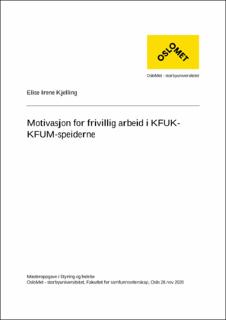Motivasjon for frivillig arbeid i KFUK- KFUM-speiderne
Master thesis
Published version
Permanent lenke
https://hdl.handle.net/11250/2762996Utgivelsesdato
2020Metadata
Vis full innførselSamlinger
Sammendrag
Denne oppgaven handler om hva som er motivasjonen bak valget om å bli speiderleder, og hvordan de kan de bli værende i KFUK-KFUM-speiderne. Studien avdekker forhold som kan brukes for å rekruttere og følge opp ledere på en bedre måte, som medfører at organisasjoner kan tilpasse seg «den nye frivilligheten». For å undersøke dette har jeg kombinert tidligere forskning på frivillighet og motivasjon, samfunnsutviklingstrekk og endringstendenser i frivilligheten med mine funn. Funnene kommer fra en spørreundersøkelse med 928 respondenter og seks dybdeintervju med to informantgrupper. Samt en analyse av organisasjonens kontekst for å forstå hvordan den påvirker frivilliges motivasjon.
KFUK-KFUM-speiderne er en del av en internasjonal speiderbevegelse. Organisasjonen er tradisjonell og gammel med stor vekt på altruistiske verdier og det å være ute i naturen, men det betyr ikke at organisasjonen opererer i et vakuum. Vi ser at den er i utvikling og omstiller seg i tråd med endringer i samfunnet. Ikke overraskende ser vi at viktige motivasjonsfaktorer blant informantene er å være nyttig, det sosiale, friluftsliv og å realisere seg selv gjennom personlig utvikling. Det er bemerkelsesverdig at relativt få har en religiøs motivasjon, som tyder på at KFUK-KFUM-speiderne har omstilt seg sekulariseringen i samfunnet. Vi kan derfor anta at KFUK-KFUM-speiderne er viktig for også andre grupper frivillige, og opprettholder sin relevans og betydning i samfunnet.
Det som skal til for å bli værende som speiderleder er samsvar mellom hva de motiveres av og hva de bruker tiden på. I tillegg vedsetter de sosiale fellesskap, oppfølging, fleksibilitet og at oppgavene og rammene for arbeidet oppleves som akseptable og meningsfulle. Av dette kan vi forstå at det er viktig for lederne at speiding ikke tar mer tid enn det de føler at de har tilgjengelig. Funnene kan brukes til å belyse hvilke motivasjonsfaktorer som er viktige for å bli frivillig speiderleder og hva som skal til for å bli værende. Ved å kjenne til hva som motiverer de frivillige vil organisasjonen ha bedre forutsetninger for å lede og styre det frivillige arbeidet. Dette vil være et stort steg i riktig retning for å oppfylle organisasjonens strategi med å utvikle og rekruttere flere gode ledere. This master thesis is about the motivation behind the choice to become a scout leader, and how they can stay in the YWCA-YMCA Guides and Scouts of Norway. The study reveals conditions that can be used to recruit and follow up managers in a better way, which means that organizations can adapt to the "new volunteering". To investigate this, I have combined previous research on volunteering and motivation, societal development features and change tendencies in volunteering with my findings. The findings come from a survey with 928 respondents and six in-depth interviews, as well as an analysis of the organization's context to understand how it affects volunteers' motivation.
The YWCA-YMCA Guides and Scouts are part of an international scout movement. The organization is traditional and old with great emphasis on altruistic values and being out in nature, but that does not mean that the organization operates in a vacuum. We see that it is evolving and adjusting in line with changes in society. Not surprisingly, we see that important motivating factors among the informants are to be useful, the social, outdoor life and personal development. It is remarkable that typically few have a religious motivation, which indicates that the YWCA-YMCA scouts have adjusted to secularization in society. We can therefore assume that the YWCA-YMCA scouts are important for other groups of volunteers as well and maintain their relevance and importance in society.
What it takes to stay as a scout leader is a correspondence between what they are motivated by and what they spend their time on. In addition, they insist on social communities, follow- up, flexibility and that the tasks are perceived as acceptable and meaningful. From this we can understand that it is important for the leaders that scouting does not take more time than they feel they have available. The findings can be used to shed light on the motivating factors that are important for becoming a volunteer scout leader and what it takes to stay. By knowing what motivates the volunteers, the organization will have better conditions for leading and managing the volunteer work. It will be a big step in the right direction to fulfill the organization's strategy of developing and recruiting more good leaders.
